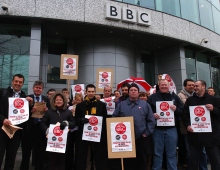BBC strike ballot kicks off
Industrial action ballot papers are due to be mailed to BBC union members from April 22 onwards.
The ballot, being run in protest at plans for thousands of job cuts and further privatisation of the Corporation, covers members of BECTU, NUJ, and Amicus.

Campaign day on March 2 - on the street even before the ballot begins
Legal restrictions on industrial action ballots require several separate votes within the BBC. Each union has to poll its own members in the BBC, and in the case of BBC Broadcast and BBC Resources - subsidiaries threatened with privatisation - BECTU has to conduct separate ballots in each company.
A series of open meetings has been set up by the unions in BBC centres across the country, where officials will update members on developments since the BBC's Director-General, Mark Thompson, announced in March that more than 3,000 jobs were to be axed, and another 3,000 staff were to be outsourced or privatised.
Go to list of meetings [Regularly updated - check this page as needed]
The union campaign against the changes began with a day of protest on March 2, before any detailed announcements had been made about cuts. Once the scale of Mark Thompson's plans became clear during March, unions gave the BBC an ultimatum under which the Corporation had the choice of agreeing to freeze the changes, or face industrial action.
At an unprecedented bargaining meeting on April 12 - the first time in more than a decade that any BBC Director-General had engaged in face-to-face negotiations with union representatives - most of the demands tabled by unions were turned down.
A call for all redundancies to be voluntary, not compulsory, was rejected by the BBC, as was a demand that any staff facing privatisation or outsourcing should have guaranteed protection of their pension rights, terms and conditions, and job security.
Unions have warned that if Thompson's changes are implemented in full, staff who survive his cull of jobs will be forced to take on work previously done by centralised specialists in areas like finance or HR - departments due to be cut by up to 50% - while others facing privatisation could be handed over to new employers who don't run final salary pension schemes.
Almost all areas of the BBC face job cuts, due either to brutal targets for budget savings, or Thompson's decision to cut back in-house programme-making departments in order to create more space for programmes bought in from the independent sector.
BECTU's information mailed to members involved in the strike ballots will focus on the BBC's unwillingness to engage in full consultation with unions before proceeding with job cuts, and the Corporation's refusal to offer binding guarantees about the future of staff who might be privatised.
Meetings planned in BBC buildings
| Date | Location | Details |
| May 9 | Broadcast Centre (White City) | 12.30 Viewing Lounge, BC2B1 Download flyer |
Amended 21 April 2005
Amended 22 April 2005
Amended 26 April 2005
Amended 4 May 2005
